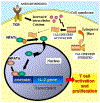Secondary immunodeficiencies, including HIV infection
- PMID: 20042227
- PMCID: PMC6151868
- DOI: 10.1016/j.jaci.2009.08.040
Secondary immunodeficiencies, including HIV infection
Abstract
Extrinsic factors can adversely affect immune responses, producing states of secondary immunodeficiency and consequent increased risk of infections. These immunodeficiencies, which can be encountered in routine clinical practice, arise from a number of conditions, such as treatment with glucocorticoids and immunomodulatory drugs, surgery and trauma, extreme environmental conditions, and chronic infections, such as those caused by HIV. The most common cause of immunodeficiency is malnutrition, affecting many communities around the world with restricted access to food resources. Protein-calorie deficiency and micronutrient deficiencies have been shown to alter immune responses; of note, recent progress has been made in the influence of vitamin D deficiency in causing failure of immune activation. Other categories of disease that might present with secondary immunodeficiency include metabolic diseases and genetic multisystemic syndromes. The immune defects observed in secondary immunodeficiency are usually heterogeneous in their clinical presentation, and their prognosis depends on the severity of the immune defect. Management of the primary condition often results in improvement of the immunodeficiency; however, this is sometimes not possible, and the risk of infections can be reduced with prompt antimicrobial treatment and prophylaxis.
Copyright 2010 American Academy of Allergy, Asthma & Immunology. Published by Mosby, Inc. All rights reserved.
Conflict of interest statement
Disclosure of potential conflict of interest: J. Chinen and W. T. Shearer have declared that they have no conflict of interest.
Figures






References
-
- Notarangelo LD. Primary immunodeficiencies. J Allergy Clin Immunol 2010;125: S182–94. - PubMed
-
- Annane D, Bellissant E, Bollaert PE, Briegel J, Confalonieri M, De Gaudio R, et al. Corticosteroids in the treatment of severe sepsis and septic shock in adults: a systematic review. JAMA 2009;301:2362–75. - PubMed
-
- Tan HP, Smaldone MC, Shapiro R. Immunosuppressive preconditioning or induction regimens, evidence to date. Drugs 2006;66:1535–45. - PubMed
-
- Black RE, Allen LH, Bhutta ZA, Caulfield LE, de Onis M, Ezzati M, et al. Maternal and Child Undernutrition Study Group. Maternal and child undernutrition: global and regional exposures and health consequences. Lancet 2008;371:243–60. - PubMed
-
- Lee SJ, Chinen J, Kavanaugh A. Immunomodulator therapy: Monoclonal antibodies, fusion proteins, cytokines, and immunoglobulins. J Allergy Clin Immunol 2010;125:S314–23. - PubMed
Publication types
MeSH terms
Substances
Grants and funding
- HD78522/HD/NICHD NIH HHS/United States
- AI6944I/AI/NIAID NIH HHS/United States
- U01 AI027551/AI/NIAID NIH HHS/United States
- U01 AI069441/AI/NIAID NIH HHS/United States
- AI36211/AI/NIAID NIH HHS/United States
- HL72705/HL/NHLBI NIH HHS/United States
- AI27551/AI/NIAID NIH HHS/United States
- HD41983/HD/NICHD NIH HHS/United States
- K01 RR000188/RR/NCRR NIH HHS/United States
- P30 AI036211/AI/NIAID NIH HHS/United States
- RR0188/RR/NCRR NIH HHS/United States
- HD79533/HD/NICHD NIH HHS/United States
- U01 HD041983/HD/NICHD NIH HHS/United States
- R01 HL072705/HL/NHLBI NIH HHS/United States
- R01 HD079533/HD/NICHD NIH HHS/United States
LinkOut - more resources
Full Text Sources
Other Literature Sources
Medical

